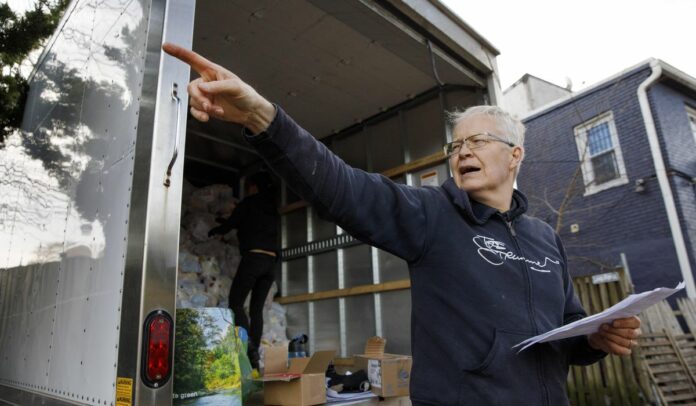Employers reopening businesses face a dilemma with older workers: follow health guidance against using employees at high risk for COVID-19, or heed age discrimination laws.
It’s a Catch-22 that has lawyers ready to pounce.
“We may be looking at a wave of age discrimination lawsuits because some employers might treat those categories differently,” said David Barron, a labor and employment lawyer in Texas.
AARP, the powerful lobby for Americans 50 and older, also is sounding an alarm.
“All employers should be advised that age discrimination is not only illegal but also bad for business,” said Susan Weinstock, vice president of financial resilience programming at AARP.
Employees must be evaluated based on their skills, not age, regardless of the coronavirus, she said.
“COVID-19 is having devastating impacts on people regardless of age or any other characteristic,” she said. “Employers need to think about the health and safety of workers, managers and customers alike. Social distancing, more regular deep cleaning of workplaces, telework and the like can all help.”
That advice doesn’t dovetail neatly with guidance from the Centers for Disease Control and Prevention.
The agency lists people 65 and older among the most vulnerable for COVID-19. The list also includes people with preexisting conditions such as obesity, diabetes and asthma.
The CDC’s “Opening up America Again” guidelines say workers who fall into vulnerable categories shouldn’t return to work until states enter phase three.
Phase three is the final stage of reopening, when the country returns to normalcy after an extended downward trend in new cases and hospitalizations.
Advanced age has been the dominant distinguishing characteristic in deaths from COVID-19, the respiratory disease caused by the novel coronavirus.
In New York, which ranks as the hardest-hit state with more than 23,000 deaths attributed to COVID-19, the state Health Department reports that people 60 and older account for 85% of the fatalities.
In Maryland, where more than 2,000 deaths are linked to COVID-19, people 60 and older account for 92% of the deaths, according to state data.
Senate Majority Leader Mitch McConnell, Kentucky Republican, is working on a major package of liability protection for businesses sued by people claiming they contracted COVID-19 at places of business.
The threat of lawsuits, Republicans say, creates a huge hurdle for reopening businesses.
“Our legislation is going to create a legal safe harbor for businesses, nonprofits, governments and workers and schools who are following public health guidelines to the best of their ability,” Mr. McConnell said.
His office would not confirm whether the proposed protections would cover age discrimination lawsuits.
Congressional Democrats oppose coronavirus liability protections.
“Especially now, we have every reason to protect our workers and our patients in all of this,” said House Speaker Nancy Pelosi, California Democrat. “So we would not be inclined to be supporting any immunity from liability.”
Still, as more states ease stay-at-home orders, businesses will have to consider how quickly to bring back at-risk employees and how to protect them when they do.
President Trump has suggested that older teachers should not return to school campuses in the fall.
“I don’t think that you should have 70-year-old teachers back yet. They should wait until everything is gone,” Mr. Trump said at a Rose Garden press conference. “I don’t think you should have a professor who is 65 and has diabetes or has a bad heart back necessarily or someone who is older than that.”
The American Federation of Teachers, which is rarely on the same page as Mr. Trump, made a similar recommendation to keep at-risk teachers out of schools when they reopen.
“COVID-19 disproportionately affects people 65 and older and those with underlying chronic health conditions. Reopening plans should consider providing these workers with the option to deliver instruction remotely while students are in the building, with students under the supervision of qualified staff,” the union said in its 21-page plan for reopening schools.
The Americans with Disabilities Act mandates that employers make accommodations in the workplace for employees with some preexisting conditions. It has no equivalent mandate for seniors.
Many workplaces, including retailers and most businesses in the service industry, cannot offer work-from-home options.
The Equal Employment Opportunity Commission is not modifying its mission to enforce employment laws that prohibit discrimination for age when workers are older than 40, or for color, religion, sex, national origin or disability.
“The EEOC wouldn’t handle age discrimination suits in the COVID-19 era any differently than other litigation,” EEOC spokeswoman Christine Saah Nazer said.
Mr. Barron, the employment lawyer, said he is watching how employers handle requests for accommodations from elderly workers who might be fearful of travel or are required to wear masks.
Some elderly may wish to return to work despite attempts to keep them home based on CDC warnings on increased hospitalizations and death rates from COVID-19.
“What I am telling employers is: Be very, very flexible and cognizant that this is a very new area of the law and we don’t know how it is all going to shake out,” Mr. Barron said.






